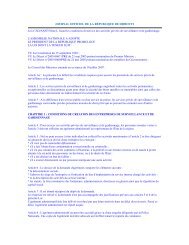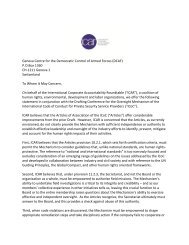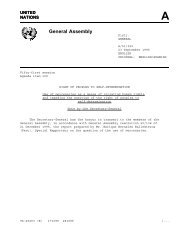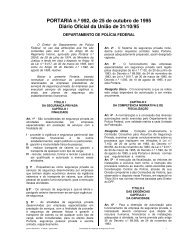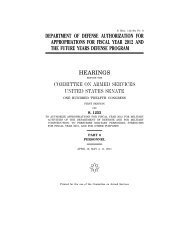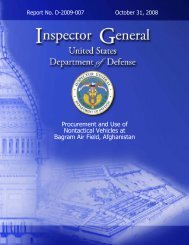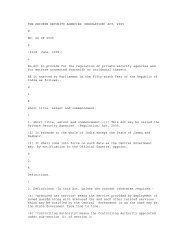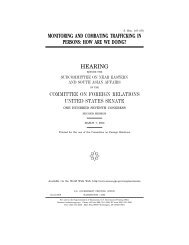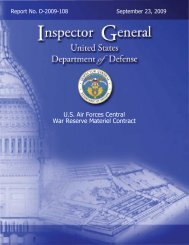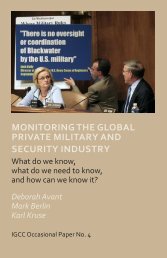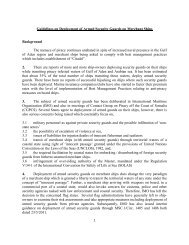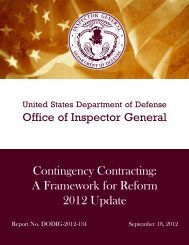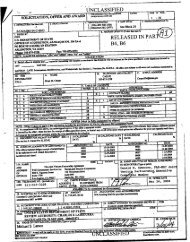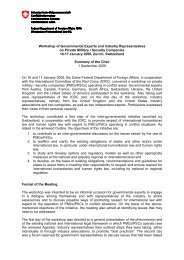Security Assistance; and Logistics - Federation of American Scientists
Security Assistance; and Logistics - Federation of American Scientists
Security Assistance; and Logistics - Federation of American Scientists
Create successful ePaper yourself
Turn your PDF publications into a flip-book with our unique Google optimized e-Paper software.
Observation 12. Iraqi Funding for Life SupportFunctions in the Iraqi MilitaryThe transition <strong>of</strong> the Iraqi Army to self-reliance in December 2007 appeared to be underfunded.The MoD had not provided Iraqi Location Comm<strong>and</strong> military bases with anOperations & Maintenance budget that covered the cost <strong>of</strong> life support issues (food,water, housing, sanitation). Rather, it had relied on a system whereby life support costswere included in an additional stipend in the payroll for the soldiers, which Iraqi Armyunits stationed at the base would provide to the base comm<strong>and</strong>er. This stipend appearedto be incapable <strong>of</strong> meeting the life support needs.Because the Iraqi life support self reliance policy was implemented without sufficientbase operating funding, the Location Comm<strong>and</strong>s that oversee the base support functionshave been unable to provide for some basic services. Units that were supposed to besupported by the Location Comm<strong>and</strong>s were either going without certain basic services orwere making up the shortfall with their own funds or other alternative means.Shortfalls in base operating support have negatively impacted operational units <strong>and</strong> havedetracted from their ability to perform their primary mission.Applicable CriteriaDoD Directive 3000.05. DoDD 3000.05, “Military Support for Stability, <strong>Security</strong>,Transition, <strong>and</strong> Reconstruction (SSTR) Operations,” November 28, 2005, providesguidance on stability operations that will evolve over time as joint operating concepts,mission sets, <strong>and</strong> lessons learned develop <strong>and</strong> establishes DoD policy <strong>and</strong> assignsresponsibilities within the DoD for planning, training, <strong>and</strong> preparing to conduct <strong>and</strong>support stability operations.Iraqi Army Life Support FunctionsIn 2006, the Iraqi Ministry <strong>of</strong> Defense took over life support functions for the Iraqi Armyfrom the Coalition Forces. By doing so, the Iraqi government became responsible forsuch life support services as providing food, water, cleaning, supplies, security, facilities<strong>and</strong> equipment maintenance, morale items, sanitation <strong>and</strong> waste removal, <strong>and</strong> mortuaryservices for more than 130,000 Iraqi Soldiers. To fulfill those responsibilities, the MoDhad funded <strong>and</strong> executed contracts for the Iraqi Army’s life support operations.By 2007, the Ministry <strong>of</strong> Defense, dissatisfied with the process <strong>and</strong> cost <strong>of</strong> contracting forfood services, suspended contracting for life support services for the Iraqi Army. Instead,the MoD implemented a Life-Support Self-Reliance program for military foodpreparation <strong>and</strong> services. 21 The MoD provided initial funding to Divisional Comm<strong>and</strong>ersto procure basic equipment <strong>and</strong> establish local food vendor support.21 The MoD’s LSSR initiative removed food services from the mission <strong>of</strong> the Location Comm<strong>and</strong>s, but theresponsibilities for other basic services remained. The Location Comm<strong>and</strong>s were still tasked with providing89



